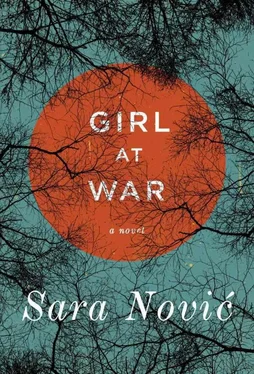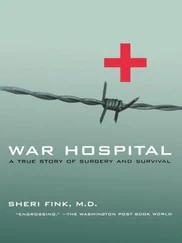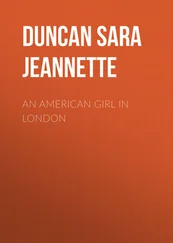“I’m not asking your permission,” I said. “I just need you to send me my passports.”
I hung up and kicked the curb until it hurt through my boot. “I’m sorry,” I said to the river. The wind off the water was frigid, and I turned up my collar against the cold.
In the dorm Natalie was asleep, and I got into bed, too, staring through the dark at the speckled drop-ceiling tiles. I hadn’t slept more than a couple hours a night for over a month, and the dream bodies were encroaching on my consciousness. Even before I’d dropped fully into sleep I felt their cool, rubbery skin against mine as surely as I did the cotton weave of my sheets. I threw back the blankets and stood too quickly, setting the darkened room spinning.
Lurching to my desk, I shook the mouse; the screen hummed to life and Natalie rolled over. In the glow of computer light I tore a piece of paper from my notebook and wrote a letter to Luka. I filled the beginning lines with perfunctory hellos and inquiries about his family. I wrote that I was living in New York City, which I knew would impress him, and that my visit to the UN had set into motion a twist of events that had made going back unavoidable. Basically, no one here knows who I am, not even me, and I think coming home might set me straight . The word home looked strange on the page, but I left it. I was trying to sound positive, or at least not on the verge of a mental breakdown. I think of you often. Not knowing whether you’re alive drives me crazy some days. So email me, or write me back, or something. And I’ll see you soon . I listed my contact details at the bottom of the letter, folded the paper into thirds, addressed the envelope to his parents’ house, and stuffed it in my schoolbag. Then I entered the Web address of a discount airfare site I’d seen on a commercial replayed over and over during one of my all-nighters, emptied my bank account of a summer’s worth of Kmart labor, and booked a ticket to Zagreb for the day after school let out.
It wasn’t until three weeks later, as the plane was cutting through the clouds over the Balkan Peninsula, that the trip seemed like a very bad idea. Luka hadn’t written back, hadn’t called or emailed. I had to find out what had happened to him, but the closer I got the more I worried about what I would discover. Black Lamb and Grey Falcon , which I’d effectively stolen from the library, felt leaden in my lap. I’d packed stupidly, I thought, with the type of retrospective clarity I’d been experiencing in bursts throughout the night of fitful plane sleep. In the end Laura had mailed me my American passport, but not my Yugoslavian one, which I’d need if I wanted to get a new one. When the flight attendant handed out customs cards with checkboxes labeled “Citizen” or “Tourist,” it struck me that Croatia was a country to which, technically, I’d never been.
I shouldered my backpack, descended the stairs, and crossed the tarmac toward the graying building of Zagreb International. The mass of concrete tapered out into two skinny terminal arms. Three other propeller planes were parked opposite the one I’d just disembarked, and from the looks of it the airfield was at full capacity.
Despite a concerted effort to keep myself calm — the war had been over for years now; we were practically a member of NATO goddammit — I spent my first minutes on the ground waiting for something to blow up. Inside the terminal, the yellow Information signs cast a sallow light through the hall. My sneakers clung to the dirty tiles, sticky with humidity and spilled soft drinks. All these years later and the place had yet to shake its Eastern Bloc aura — the posturing with size and cement, a woman with a brash smear of cherry lipstick she can’t quite pull off. I made my way past a cluster of confused tourists to the front of the immigration line. I liked the power that came with pushing through a crowd, the kind of shoving that would be unacceptable in America. I didn’t say excuse me.
“HelloDobarDan,” said the customs agent when I reached the window. He put a hand out in request for my documents. Upon receipt of my American passport he mumbled something in broken English and reached for a stack of immigration forms.
“Dobar dan,” I tried. The words were rough in my throat. “Kako ste vi danas?” I’d conjugated the phrase formally but correctly, and stroking his mustache, he looked me over as if I’d presented him with false papers. I met his gaze. He returned the blank forms to the top of the pile.
“Welcome back,” he said in Croatian and waved me through.
Outside families were coming together. A set of toddler twins in matching sunglasses flung themselves at an elderly man. A young man in a Dinamo jersey flagged down his weary fiancée and lifted her off the floor in their embrace; the color crawled back into her cheeks when they kissed. A man in a dark suit met another in like clothing. At first they looked like corporate associates, but when they hugged and clenched their jaws, I recognized their reunion immediately as the business of burial. I looked away.
The baggage carousel squeaked along at a lethargic pace. Many bags had been strangled with industrial-grade plastic wrap. I spotted my suitcase, relatively unharmed, heaved it off the belt, and walked out into the open lot.
The airport was far outside the city, so I handed my bag to a man in an official-looking reflective vest and boarded a bus marked ZAGREB CENTAR. I realized it was a mistake as soon as the driver requested twenty kunas, too much for a regular bus ride. It was probably a private company designed to scam tourists, but I hadn’t seen any other public transport in the lot, and my suitcase was already in the belly of the bus.
“I haven’t changed any money yet,” I said to the driver in English, suspecting he’d take the news better that way.
“Two-zero kuna to Autobus Station Zagreb,” he said, palm out. I handed him a five-dollar bill, which he pocketed without issuing me a ticket.
After a stint on the new highway between the airport and city, I exited Autobusni Kolodvor and walked into the city center. Zagreb seemed both smaller and more beautiful than the simulacrum I’d constructed in my head. Red and yellow tulips bloomed in beds across the city, and the cobblestone walkways, soaked in summer sun, looked cleaner than I remembered. While people on the street were clothed in fashions long passed in America, they looked well fed, with no outward signs of distress. Only the occasional shelling damage in the building façades gave any confirmation that a war had taken place.
I continued down Branimirova, a street that had become unrecognizably commercial. Boutiques peddling jewelry, jeans, and cellphones had cropped up to create an unbroken, mall-like storefront. I thought of the gifts I’d brought for Luka and Petar and Marina — things I’d found new and exciting in America when I’d first arrived — and felt embarrassed. From the looks of it, they’d imported everything already.
Hotels, big international ones, stood behind the market. I knew the city must have had hotels when I was young, but I could neither remember them nor imagine who would have wanted to stay in them. On the left Glavni Kolodvor came into view — Zagreb’s Grand Central, everyone joked, though in reality it was older than the New York terminal.
Until this point I’d been walking straight, avoiding the question of an exact destination, but soon I’d have to turn off if I wanted to go to Luka’s parents’ house. Property usually only changed hands via inheritance, so it was unlikely that they had moved. Luka would be there, too; students lived at home with their families while attending university. Was it better to go and get it over with, or stop at the hostel first and try to wash up? Should I try to find a pay phone with a phone book to see if his family was even still listed? I decided it was best to go look for him right away — chances were slim that a hostel shower would put me in a clearer state of mind. But the weight of whatever I might find there was slowing my steps. The prospects of having lost or coming face-to-face with the person who’d known me best were equally terrifying.
Читать дальше












